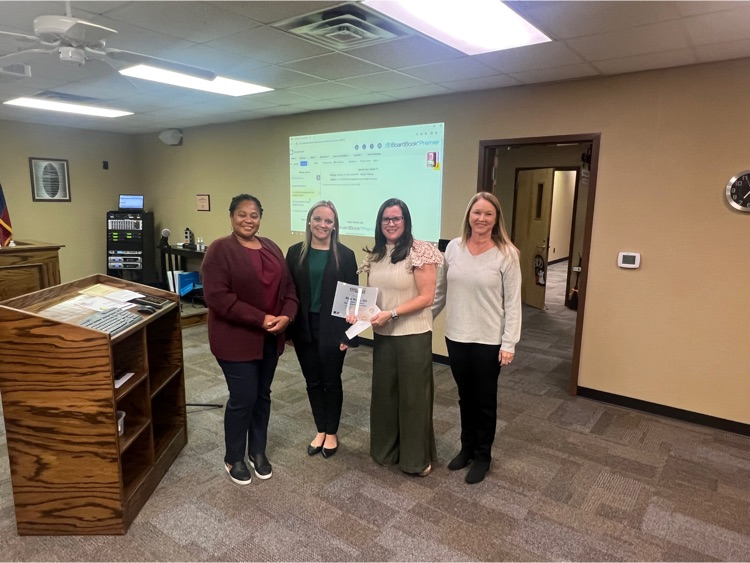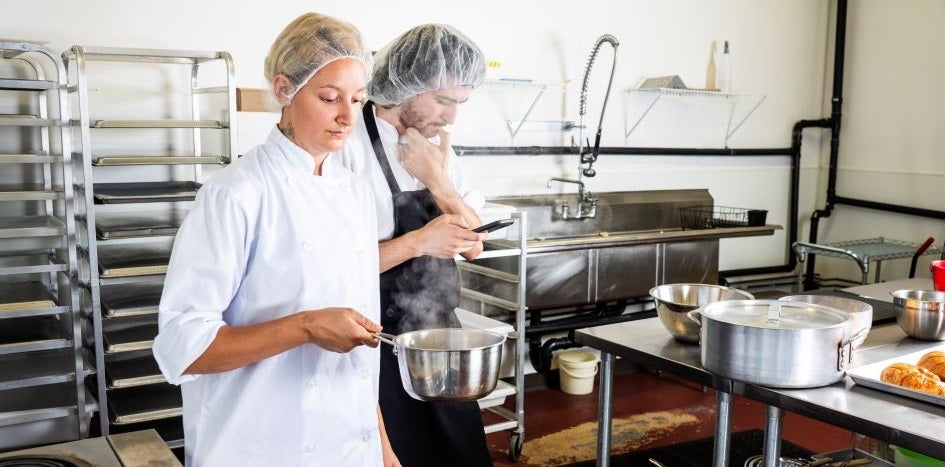Blue Ridge ISD Reimagines Student Behavior Management
A fourth-grade student throws a stapler at his teacher's head when she denies him a hall pass. A teenager assaults her teacher when the teacher confiscates the girl's phone. A middle-schooler pushes a paraprofessional into a wall because she told him to put his hand-held video game away.
In each of these scenarios, staff might have been within their rights under Texas law to restrain the students. Blue Ridge ISD trains its Special Education (SpEd) team to first consider a different path.

TASB Senior Marketing Consultant Jennifer Jones (left) presents a Fund Excellence Award to Blue Ridge ISD Chief Financial Officer Amanda Ray, Coordinator of Special Education and Intervention Services Terra Mathers, and Payroll and Benefits Manager Keri Johnson
"There are certainly situations in which restraint is necessary. But we know that if we restrain someone, the relationship is broken at some level, regardless of whether we followed protocol,” said Superintendent Dr. Darrell Floyd. “Restraints also create an unsafe environment for staff and students. We emphasize a proactive approach built on de-escalation whenever possible.”
Evidence indicates the district's strategy works. Incidents requiring restraint are down. So are student-caused injuries. That's all well and good if you're trying to earn a Fund Excellence Award (Blue Ridge ISD did), but what about the other metrics that matter to districts?
Dr. Floyd reports that students in special education are performing better in the classroom and dropout rates are down. He was happy to pull back the curtain on the district’s initiative and share strategies other Fund members will benefit from hearing about.
Beyond Academics
Injuries caused by another person account for nearly one-quarter of claims filed by Fund members with Workers' Compensation coverage. To be clear, student behavior issues aren’t limited to SpEd classrooms. A national school survey showed that threats of physical harm are up 16% since 2020. Meanwhile, physical attacks are up 13%, and verbal abuse is up an eye-popping 40%.
Consistent with state requirements, every Blue Ridge ISD campus maintains a certified crisis intervention team. The team includes at least one employee trained in mental health first aid for adolescents. But what separates the district’s student behavior management protocol is something you won’t find on a compliance checklist: relationships and trust.
"When children trust adults, they know they are in a safe place,” said Dr. Floyd. “They can then learn to better express themselves when frustrated or angry. We continuously focus on building relationships, encouraging trust, and deepening our capacity to avoid situations in which restraint is necessary."
Blue Ridge ISD also puts a premium on relationships with families. SpEd staff attends extracurricular activities and community events to connect with parents and other caregivers. Face-to-face interactions demonstrate the district's investment in kids beyond academic success.
Just Breathe
Let’s revisit the scenario where a fourth grader threw a stapler at his teacher after she denied him a hall pass. Sensing the situation was escalating, the teacher could have drawn on best practices she learned during her training: act empathetically, avoid challenging questions, allow the student to verbally vent, set and enforce reasonable limits.
Blue Ridge ISD employees have one more strategy in their de-escalation toolbox. They’re called calm-down spaces, and they’ve shown promise in reducing student behaviors such inattentiveness, impulsivity, and overactivity.
“Our staff communicates with students to identify their ideal calm-down space where they can just breathe and return to a neutral, stable state,” explained Dr. Floyd. “We also ask them to designate a few staff members who they trust and who they can go to when they need help. We work hard to meet students where they are.”
When a situation de-escalates, the focus shifts to helping everyone involved, including employees, avoid similar situations in the future. Dr. Floyd acknowledges that the district can’t prevent every crisis, but it can leverage them as growth opportunities.
“We’re always looking to enhance our policies and procedures based on lessons learned,” said Dr. Floyd. “At the same time, we never want to lose focus on people. Strong partnerships between families and district staff foster not only safer campuses but also student success inside and outside the classroom.”
Additional Resources
- Physical Force and Restraint with SPED Students – United Educators Association of Texas
- Seclusions and Restraint Statutes, Regulations, Policies and Guidance- U.S. Department of Education
- Office of Special Education and Rehabilitative Services - U.S. Department of Education
- TASB Policies FO (LOCAL), FO (LEGAL), and FOF(LEGAL)

David Wylie
David Wylie serves as content developer on the risk solutions team. He brings more than 20 years' experience writing educational content that helps employers protect against workplace accidents, property damage, cybercrime, and other losses.
You May Also Like…
View All Related Insights
How To Manage and Mitigate Your Burn Risks
From bustling kitchens to science labs to maintenance and transportation shops, there are plenty of opportunities for burns to occur at your school or community college.

The Importance of a Thorough Accident Investigation
Conduct accident investigations to uncover the root causes of workplace injuries, correct them, and reduce the risk of similar injuries.

A Bird’s Eye View of Integrated Pest Management Compliance
State law requires schools to designate a trained integrated pest management (IPM) coordinator and implement an IPM program that includes these core elements.

Are Science Experiments at Home Safe?
Online science curriculum vendors should give parents and students the information and equipment necessary to complete assignments safely.
